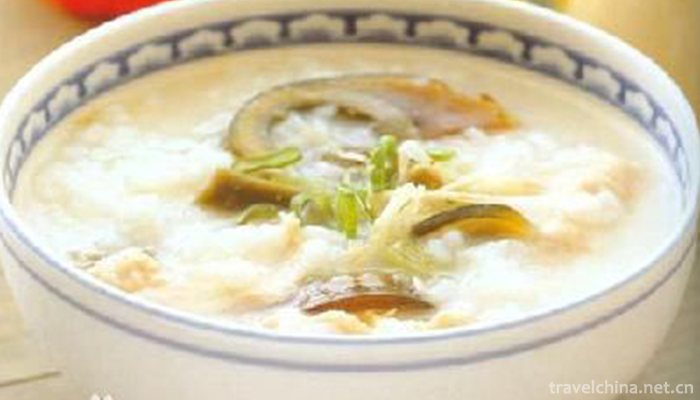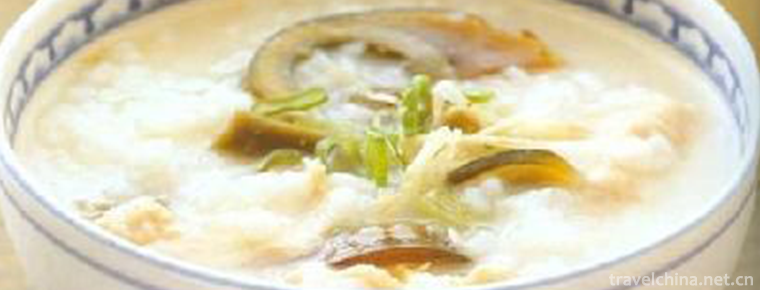Eight treasures porridge
Eight treasures porridge
Babao porridge is a dish of Manchu and Han Dynasty. It tastes sweet and delicious and enjoys a high reputation.
Making raw materials
Jiangmi 150g, red beans 75g, mung beans 75g, jujube 50g, lotus seeds 50g, peach kernels 50g, peanut kernels 50g, chestnut 50g, alkaloid 0.5g.
Making process
1. Wash red beans and mung beans and put them in two small aluminium basins separately, add water, no more than 4 cm of bean noodles, boil for 1 hour, the skin of beans bursts open and the soup of beans is ready to boil; add lotus seeds to alkaloids, brush them with clean water, remove the skin, poke out the lotus heart and wash them; peel off the inner and outer layers of chestnuts, wash them; peel peanut kernels, break them into two halves; soak peanut rice in a boiling water basin for 10 minutes. Minutes, pinch off the skin; wash and nucleate the jujube; wash the rice with clean water.
2. Pour clear water into a copper pot and boil it in a vigorous fire. Add rice, red beans, mung beans, lotus seeds, chestnuts, peaches, peanuts and jujubes. Boil them again. Then boil them over a low heat for about 30 minutes until the rice juice is thick.


-
1.Eastern Royal Tombs of the Qing Dynasty
Eastern Royal Tombs of the Qing Dynasty is located 30 kilometers northwest of Zunhua City, Tangshan City, Hebei Province. It is 125 kilometers west of Beijing City and covers an area of 80 square kil
Time 2018-11-24 -
2.Tianshan Tianchi Scenic Area
Tianchi Mountain: World Natural Heritage, National AAAAA Class Tourist Scenic Spot, National Geopark, National Key Scenic Spot, National Civilized Scenic Spot, International and Natural Biosphere Rese
Time 2018-12-12 -
3.Qinghui Garden
Qinghui Garden is an ancient garden building built in Ming Dynasty. Located in Qinghui Road, Daliang Town, Shunde District, Foshan City, Guangdong Province,
Time 2019-02-07 -
4.Fouriers Magic
Fu Tenglong, a national first-class actor and famous magic performer, is a member of the art team in the 1950s. Fu Tenglong was born in a magic family. He is an international magician who integrates p
Time 2019-05-04 -
5.Li nationality costumes
Li costumes are mainly made of island cotton, hemp, kapok, bark fiber and silk. In ancient times, some places also used the bark of twig or bloody throat trees as clothing materials. This kind of dres
Time 2019-05-12 -
6.Traditional Brewing Techniques of Brewing Wine
The traditional brewing technology of Jinhua liquor is the traditional handicraft technology of Jinhua City, Zhejiang Province. The typical representative and complete remains
Time 2019-06-07 -
7.Qiang Mu Zashrunbu Temple Shigatse
Qiang Mu is a religious dance, also known as "Dancing God". "Semochim Qiang Mu" is a Tibetan Buddhist Gru-sect Qiang Mu performed by monks at Zashrunbu Monastery in Xikaze, Tibet.
Time 2019-06-11 -
8.Manufacturing Techniques of Tianfu Sauce Elbow
Tianfu Sauce Meat Shop was founded in 1738, the third year of Qianlong in Qing Dynasty, when Shandong was in a severe drought and there was no grain harvest. Liu Fengxiang, a man from Yexian County, S
Time 2019-06-20 -
9.Twelve tunes of bronze drum
The Buyi bronze drum is one of the ancient percussion instruments of the Buyi nationality, which belongs to the precious national cultural heritage. It is made of bronze, often mixed with Suona, drums
Time 2019-06-21 -
10.Sintering Techniques of Xingyao Ceramics
Xingyao firing technology is a local traditional handicraft in Hebei Province. Xing kiln is a famous northern kiln in China. As early as the Northern Dynasty, Xing kiln began firing celadon and a smal
Time 2019-07-08 -
11.Yongkang Drum Ci
Yongkang Drum Ci is a rap art in Yongkang area of Zhejiang Province. It belongs to the form of singing and talking, which is mainly composed of singing. Because of the use of local dialect performance
Time 2019-07-14 -
12.Zhenwu mountain ancient Temple Group
Zhenwu mountain ancient Temple group is located in the urban area of Yibin City, adjacent to Cuiping mountain, with an altitude of 396 meters. It is named for Zhenwu temple on the mountain, covering an area of more than 50 mu.
Time 2020-10-16